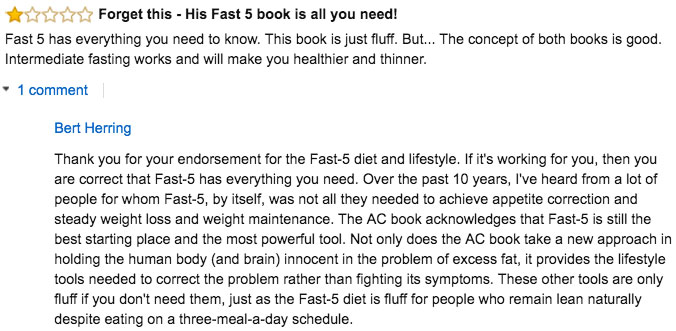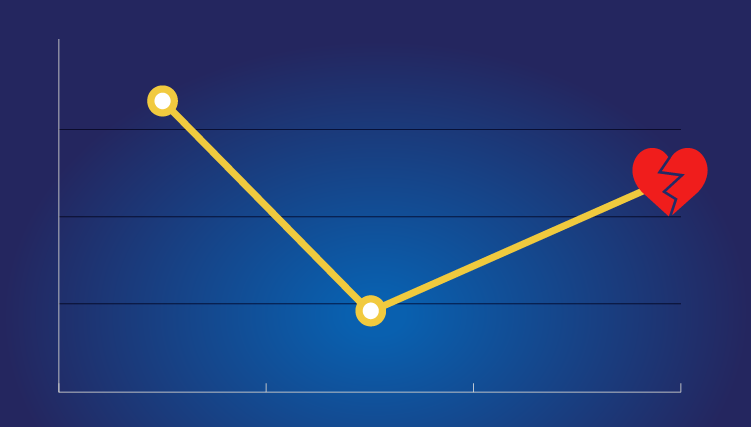 An Amazon reader recently posted a 1-star review on AC: The Power of Appetite Correction. The reader indicated that “Fast-5 is all you need to know.” For a good many people, the reader is correct—Fast-5, a daily cycle of 19 hours of fasting with a 5-hour eating window, is such a powerful tool that it alone is often sufficient to correct appetite, achieve steady fat loss and allow one to maintain a goal weight without fighting hunger. However, in the ten years since I wrote The Fast-5 Diet and the Fast-5 Lifestyle, I’ve heard from quite a few people for whom Fast-5 alone was not enough to achieve success.
An Amazon reader recently posted a 1-star review on AC: The Power of Appetite Correction. The reader indicated that “Fast-5 is all you need to know.” For a good many people, the reader is correct—Fast-5, a daily cycle of 19 hours of fasting with a 5-hour eating window, is such a powerful tool that it alone is often sufficient to correct appetite, achieve steady fat loss and allow one to maintain a goal weight without fighting hunger. However, in the ten years since I wrote The Fast-5 Diet and the Fast-5 Lifestyle, I’ve heard from quite a few people for whom Fast-5 alone was not enough to achieve success.
I can relate to the reader’s perspective. For many men, it’s easy to put Fast-5 into practice and shed pounds. It’s so high-speed/low-drag it seems like it’s going to work that way for everyone. But even that, for me, was a radical change in perspective. Back in 1995, I had no expectation that my accidental schedule (that I would eventually call “Fast-5”) would have any impact on weight loss at all. My mindset was all about calories in, calories out. Had anyone asked me, I would have said timing couldn’t possibly matter. By 2005, when I wrote Fast-5, my perspective had shifted completely and I realized Fast-5 could work for others. I didn’t—and still don’t—expect it to work perfectly for everyone.
The reader’s critique reveals a misconception, one I shared early on. That misconception is that the humans are basically identical machines with different skins. The real-world results and research studies that have come to my attention in the past ten years have informed me that this notion is absurd. Each human is a one-of-a-kind work of physiologic art, and each of us also carries a unique, dynamic garden of microbes in the gut that can affect digestion and other body functions, including direct effects on the brain, in ways that were scarcely conceivable ten years ago. Even identical twins age differently and have different microbial content.
Not only is each human uniquely constructed, they and their gut flora (the gardens of microbes in the intestine) are constantly in flux, different every day. Some changes are gradual, some are abrupt. What we think of as a transient illness with diarrhea may change the composition of our gut flora forever; so can a course of antibiotics, shifting the diet from omnivore to vegetarian, traveling to a foreign country, or moving to a different location. Since the body is a work in progress, the selection of tools used to manage appetite must also be a dynamic process.
That’s where appetite correction (AC) comes in. AC seeks to stop the diet fight by getting the appetite system working like it should. Fast-5 can go a long way to getting there, but while it’s the only tool necessary for some people, it’s not the only tool needed for all people. From ten years of helping people augment their efforts with Fast-5, I came up with a list of 16 other tools that can help—tools that can also be of benefit to those who find Fast-5 incompatible with their lifestyle for one reason or another. With my perspective focused on correcting appetite, I’m on the hunt for more non-drug, non-surgical tools to add to the AC tool shed.
Putting different tools together and tweaking them with personal customizations creates an individualized weight loss/weight maintenance lifestyle that can change and adapt over time. Your combination of tools and the way you put them into practice may be different than anyone else in the world. Would you expect it to be otherwise, given that your body—and the microbe garden it carries—is unlike any other in the world?
Another important perspective that AC brings forward is that an obese or overweight person is not a malfunctioning human body. The overweight human body does not need surgery or drugs. The overweight human body is working perfectly, but it is not responding the way we’d prefer in an obesogenic culture that it is constantly and successfully driving overeating for the sake of money. Thus, each of the tools offered in AC seeks to shield the human body from the obesogenic culture so it can operate normally, with both the mind and body working together, rather than fighting—a fight that rarely ends well, as described in the New York Times “Biggest Loser” story and the counterpoint opinion piece by Sandra Aamodt.
It would do our culture—and the overweight people involved—a lot of good if we could shift our collective perspective to see overweight people not as malfunctioning, weak-willed people, but as casualties of a food-centric eco-culture, who through tools like those in AC, and with some help from the healthy tribe around them, can and will recover completely.


![[INFOGRAPHIC] 2016 AC/Fast-5 Survey Results](https://www.bertherring.com/wp-content/uploads/2016/05/facebook-feat-01-1.jpg)
4 comments
I read the article from the NYT on the Biggest Losers and the drop in their metabolism. Dr Bert, has anyone measured the metabolism of people following Fast-5/AC? Reading the NYT article gave me anxiety, thinking of how I could lower my metabolism by dieting.
It’s understandable that the NYT article would prompt some anxiety. Some drop in metabolism while dieting is to be expected, at least if you’re successful—as your body gets smaller, it needs less energy if everything else stays the same (which is usually not the case). I don’t know of any metabolism measurements on Fast-5ers, but I do know that Fast-5ers do not see the kind of rebound weight gain described in the Biggest Losers. The key difference is that with Fast-5, appetite is corrected and people eat as much as they want, so the body does not get the message that it’s in a food-scarce environment the way it does with willpower-based reductions in intake that can result in reductions in metabolic rates. You are welcome to ask about the long-term experiences of Fast-5ers in the private Facebook group.
Do you still need to worry about calories needed for a day? What if your to low
If you have excess fat, then the number of calories needed for the day is zero, because your body will use its fat (fuel) reserve instead of burning what you eat. The beauty of appetite correction is that once it’s taken effect, you don’t have to count calories. You eat what you want, and you want less because your body is counting the calories for you and keeping the balance right just as it does for all the non-human animals in the world that are not fed by humans. If you have surplus fat, and don’t feel like eating, there’s no reason you have to. Fasting for several days or more is best done with some medical supervision, but if someone doesn’t care to eat much on a given day, there’s no reason they must eat a certain minimum. That would be akin to saying “I have to put three gallons of fuel in my car every day no matter how far I drive and even though the tank is already over full and stretched beyond normal capacity.” If appetite correction has taken effect as it usually does with an AC/Fast-5 schedule, you can let your body know there’s food available by eating when you have the appetite center tells you to, and it can take care of the rest.